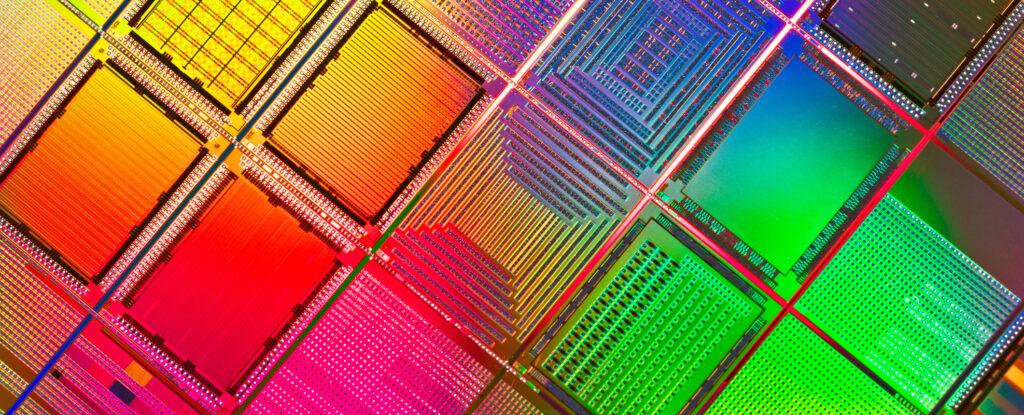The advancement of robust computer chips, crucial for the next wave of artificial intelligence (AI) technologies, could wield a substantial influence on global politics and security.
Currently, the United States leads in designing these chips, also known as semiconductors, at the forefront, with the majority of production taking place in Taiwan. The discourse has been sparked by Sam Altman, the CEO of OpenAI, the developer of ChatGPT, who proposed a global investment ranging from US\( 5 trillion to US\) 3 trillion (£3.9 trillion to $5 trillion) to foster the creation of more potent chips for the forthcoming AI era.
Altman’s proposed funding surpasses the total historical expenditure of the chip industry. Despite these specifics, the overall projections for the AI sector are staggering. GlobalData, an information analytics provider, forecasts that the industry could reach a value of US$ 909 billion by 2030.
Over the past two decades, the United States, China, Japan, and various European nations have escalated their budget allocations and implemented strategies to secure or retain a portion of the chip market. China is swiftly advancing, offering substantial subsidies for chip production, including those geared towards the next generation of AI, with investments amounting to hundreds of billions over the next decade to establish a burgeoning supply chain.
Germany also seems to favor subsidies as an approach. The UK government has pledged £100 million to support institutions and regulators in addressing AI-related issues.
Chris Miller, the author of “Chip War,” an economic writer, has highlighted how chips have evolved into a “strategic commodity” in the realm of geopolitics.
Despite the global investments in chip technology, there is currently a scarcity of chips essential for AI applications. According to Miller, a single company manufactures 90% of the chips fueling or enhancing AI technologies.
This company is the Taiwan Semiconductor Manufacturing Company (TSMC). The region is a focal point of tensions between China and the US, underscoring Taiwan’s significant role in the chip manufacturing sector.
Since the mid-20th century, Taiwan has largely maintained its autonomy. While Beijing envisions Taiwan’s reunification with China, US legislation mandates Washington’s support in defending Taiwan against invasion. The potential outcomes for the chip market in such a scenario remain uncertain but are undoubtedly a matter of global apprehension.
Disruptions in chip supply chains have the potential to disrupt entire industries. The availability of raw materials crucial for computer chip production, such as rare earth metals, poses a significant obstacle. For example, China dominates the global output of germanium (80%) and gallium (60%), essential raw materials in device manufacturing.
Moreover, challenges like Extreme Ultraviolet (EUV) lithography, vital for shrinking computer chips to enhance efficiency, are critical. The exclusive producer of EUV systems for device manufacturing is ASML, a company based in the Netherlands.
However, chip companies are expanding beyond Asia, potentially reducing reliance on limited supply chains. Significant investments are being made in the US, with amounts ranging from US\( 43 billion to US\) 53 billion.
For instance, TSMC plans to establish a multibillion-dollar facility in Arizona. While this facility may not initially produce the most advanced chips currently available, many of which are produced in Taiwan, diversifying chip production beyond Taiwan could mitigate global supply risks. Nonetheless, the impact of such a shift may take years to materialize. The inclusion of computer chips as a global security concern in discussions, such as the Munich Security Conference, underscores the importance of this industry.
Greater challenges
The significance of chips in supporting AI expansion is just one aspect of how AI will shape politics and global security. In recent years, digital propaganda has altered elections by amplifying biases on various sides of conflicts.
Instances include the Brexit campaign, US national elections, and more recently, the Gaza conflict. AI stands out as a potent tool for deception, particularly through AI-generated content like videos, audio, or images of public figures, capable of misleading audiences.
At the 2024 Munich Security Conference, 20 leading software companies introduced the “Tech Accord” as a testament to the growing importance of combating deepfakes. They committed to collaborating on tools to detect, identify, and counter deepfakes.
However, the responsibility of addressing such critical issues should not solely rest on tech companies. Regulatory frameworks like the EU’s Digital Service Act and the UK’s Online Safety Bill, along with AI governance mechanisms, are crucial. Their effectiveness in resolving these challenges remains to be seen.
The impact of AI extends beyond the chip market and the demand driven by AI development, but its significance cannot be overstated. National leaders and policymakers must acknowledge and prepare for the transformative potential of AI, which may surpass our ability to navigate geopolitical shifts and global security concerns.
Alina Vaduva, Director of the Business Advice Centre for Post Graduate Kids at UEL and Ambassador of the Centre for Innovation, Management and Enterprise, University of East London, and Kirk Chang, Professor of Management and Technology, University of East London
This content has been republished from The Conversation under a Creative Commons license. Read the original content.










